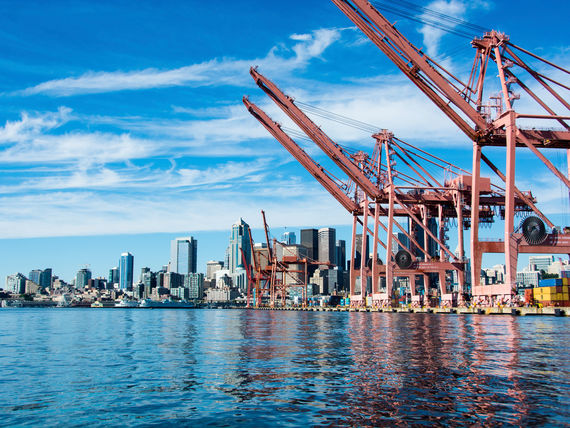Trendwatch: Canada dock workers' union, employers reach tentative deal, avert strike; US-EU steel talks inch ahead as time for a deal runs short; Japan builds supply chain for EV battery minerals in Africa

Canada dock workers' union, employers reach tentative deal, avert strike
A dock workers' union on Canada's West Coast and port employers have provisionally agreed to a new labour contract, averting an immediate strike, but the agreement needs to be approved by workers who rejected a previous deal.
Ottawa intervened in the labour dispute in an effort to keep two of Canada's three busiest ports, the ports of Vancouver and Prince Rupert, open after a nearly two-week strike disrupted more than C$6 billion ($4.6 billion) in trade.
The International Longshore and Warehouse Canada Union (ILWU) and the British Columbia Maritime Employers Association (BCMEA) are recommending ratification of the new deal, they said in a joint statement late on Sunday. Terms were not disclosed.
US-EU steel talks inch ahead as time for a deal runs short
The US and European Union are unlikely to finalize a legally binding agreement to govern trade in steel and aluminum this year, setting up a decision to either extend an October deadline or allow the return of tariffs on billions of dollars of transatlantic exports.
Talks on the so-called Global Arrangement on Sustainable Steel and Aluminum have intensified in recent weeks and progress has been made in the key area of how to measure and tackle oversupply from nations including China, according to people familiar with the discussions. But absent a final deal by Oct. 31, Trump-era tariffs — and EU retaliatory measures — would automatically return on more than $10 billion of exports if the two sides don’t extend the current truce.
The GSA aims to settle a conflict that started in 2018, when Trump slapped tariffs on steel and aluminum exports from Europe, citing risks to national security. Two years ago, the US and the EU agreed to pause the punitive measures in an effort to find a permanent solution.
Japan builds supply chain for EV battery minerals in Africa
TOKYO -- Japan's government plans to work with three African nations to develop supply chains for cobalt and other minerals critical in making electric vehicle batteries, Nikkei has learned.
Tokyo will team with Zambia, the Democratic Republic of Congo and Namibia to expand joint exploration in each country. The projects are due to start as soon as within the year.
Japan looks to diversify its sources of critical minerals, including lithium, in order to enhance economic security and counter China's growing investment in African countries.
UK drops bid to replace Europe’s ‘CE’ quality mark post-Brexit
Rishi Sunak’s government said companies can use the European Union’s product safety mark indefinitely, a climbdown on a post-Brexit plan to enforce the UK’s own standard that was criticized by businesses.
Companies can continue to apply for the EU “CE” label to sell goods in Britain, the Department for Business and Trade said Tuesday, instead of having to apply for the “UKCA” mark — a requirement that had been due to kick in from 2025.
The decision will mitigate one of the ironies of Brexit, which is that a project pitched as reducing red tape has in fact created new barriers to trade with Britain’s largest trading partner. Under the previous plan, businesses wanting to sell their goods in both the UK and EU faced an an extra hurdle to get both stamps on the same product, or even develop separate production lines.
Global demand for coal Is bringing mayhem to South African towns
An often impenetrable logjam of trucks laden with coal at South Africa’s crossing with Mozambique has brought chaos to a sleepy border town.
Elephants escaping from the nearby Kruger National Park often caused the biggest commotion in Komatipoort. These days residents check their CCTV cameras on their phones at barbecues on the weekend. The congestion created opportunities for criminals who saw drivers stranded in the queue for days on end as easy targets after nightfall. Robberies, theft and assaults spread from the highway to the town. Road accidents increased.
U.S. Department of Energy launches program to expand state and local capacity for renewable energy planning, siting and permitting
Today, the U.S. Department of Energy (DOE) launched a new initiative to support states and local communities as they plan for and evaluate proposed development of large renewable energy facilities. The Renewable Energy Siting through Technical Engagement and Planning (R-STEP) program will support the creation of new, or the expansion of existing, state-based programs or initiatives that improve renewable energy planning and siting processes for local communities. Large-scale renewable energy projects, especially wind and solar facilities, have a pivotal role in decarbonizing the grid quickly and cost-effectively to achieve President Biden’s goals of a 100% clean electricity sector by 2035 and net-zero emissions economy by 2050. By supporting state-based programs that serve as a resource to local communities, R-STEP will improve renewable energy deployment outcomes for host communities, especially disadvantaged communities, local governments, and renewable energy developers.


